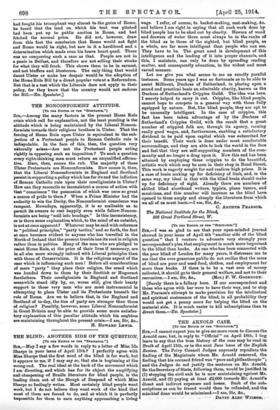THE BLIND: ANOTHER SIDE OF THE QUESTION. [To ma Elenos
or me "erscr.roa'] Sra,—May I say a few words in reply to a letter of Miss Ida Sharpe in your issue of April 11th P I perfectly agree with Miss Sharpe that the first need of the blind is for work, but it appears to me, if I may say so, that she is beginning at the wrong end. The real ideal at the back of the movement which I am directing, and which has for its object the amplifying and cheapening of Braille literature for blind people, is the leading them out of the Slough of Despond of which Miss Sharpe so feelingly writes. Most certainly blind people want work, but I do not believe they want work of the kind that most of them are forced to do, and at which it is perfeotly impossible for them to earn anything approaching a living wage. I refer, of course, to basket-making, mat-making, Rze. and believe I am right in saying that all such work done by blind people has to be eked out by charity. Hewers of wood and drawers of water there must always be in the ranks of the blind as in those of the sighted, but blind people, as a whole, are far more intelligent than people who can see. They have to be. The great need is development of this intelligence and the leading of it into proper channels, and this, I maintain, can only be done by spreading reading matter, and consequently education, in the widest and most varied manner.
Let me give you what seems to me an exactly parallel instance. Some years ago I was so fortunate as to be able to assist Millicent, Duchess of Sutherland, in placing upon a sound and practical basis an admirable charity, known as the Duchess of Sutherland's Cripples Guild. The idea was hers. I merely helped to carry it out. Cripples, like blind people, cannot hope to compete in a general way with those fully equipped by nature. But, like blind people, they are apt to be unusually intelligent. In the ease of cripples, this fact has been taken advantage of by the Duchess of Sutherland's Cripples Guild, with the result that a great number of crippled folk are, through its agency, earning really good wages, and, furthermore, enabling a satisfactory dividend to be paid upon capital which was subscribed for their benefit. Their work is done under most comfortable surroundings, and they are able to look the world in the face and feel that they are self-supporting members of the com- munity and no longer a drag upon it. Now this end has been attained by employing these cripples to do the beautiful, artistic work which may be seen in their shop in Bond Street. This work is eagerly sought for and realizes high prices. It is a case of brain making up for deficiency of limb, and, in the same way, my ideal is that with the blind brain should make up for deficiency of sight. Already there are numbers of skilled blind shorthand writers, typists, piano tuners, and musicians, and this number will increase as the blind have opened to them amply and cheaply the literature from which we all of us must learn.—I am, Sir, &a, 206 Great Portland Street, W.


























































 Previous page
Previous page